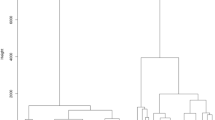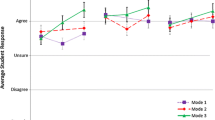Abstract
Research on effective teaching has produced useful knowledge regarding instructional techniques dealing with classroom management, teacher-centered direct or explicit instruction, student time-on-task, questioning, and cognitive instruction for low-achieving students. Research on effective schools has produced useful knowledge regarding the characteristics or correlates of schools that are unusually successful in enhancing student achievement. Projects that utilize these research findings in working to improve teacher and school effectiveness have been and are being conducted in many big cities. While encouraging results have been registered in some locations, achievement is still unacceptably low in many cities. Efforts in the future should draw systematically on research dealing with effective classrooms and effective schools.
Similar content being viewed by others
References
Allington, R. L. (1986). What is remedial reading? A descriptive study.Reading Research and Instruction 26(1): 15–25.
Anyon, J. (1980). Social class and the hidden curriculum of work.Journal of Education 162: 67–92.
Brophy, J. (1983). Classroom organization and management.Elementary School Journal (83): 265–285.
Brophy, J. E. (1988). Educating teachers about managing classroom and students.Teaching and Teacher Education 4(1): 1–18.
Chubb, J. E. (1988). Why the current wave of school reform will fail.The Public Interest Winter: 28–49.
Crandall, D. P., Eiseman, J. W., and Louis, K. S. (1986). Strategic planning issues that bear on the success of school improvement efforts.Educational Administration Quarterly 22(3): 21–53.
Edmonds, R. E. (1982). Programs of school improvement: An overview.Educational Leadership 40(3): 4–12.
Idol, L., and Jones, B. F., eds., (1990).Educational Values and Cognitive Instruction. Implications for Reform. Hillsdale, NJ: Erlbaum.
Kozberg, G., and Winegar, J. (1981). The South Boston story: Implications for secondary schools.Phi Delta Kappan 62(8): 565–567.
Levine, D. U. (1988). Teaching thinking to at-risk students: Generalizations and speculation. In Barbara Z. Presseisen (ed.),At-Risk Students and Thinking: Perspectives from Research pp. 117–137. Washington, DC: NEA.
Levine, D. U., and Cooper, E. J. (1990). The change process and its implications in teaching thinking. In Lorna Idol and Beau F. Jones (eds.),Educational Values and Cognitive Instruction: Implications for Reform. Hillsdale, NJ: Erlbaum.
Levine, D. U., and Eubanks, E. E. (1989). Organizational arrangements at effective secondary schools. In Herbert J. Walberg and John J. Lane (eds.),Organizing for Learning pp. 41–49. Reston, VA: National Association of Secondary School Principals.
Levine, D. U., and Havighurst, R. J. (1989).Society and Education 7th ed. Needham Heights, MA: Allyn and Bacon.
Levine, D. U., and Lezotte, L. W. (1989).An Interpretive Review and Analysis of Research and Practice Dealing with Unusually Effective Schools. Madison, WI: University of Wisconsin Press.
Lezotte, L. W., and Taylor, B. A. (1989).Case Studies in Effective Schools. Madison, WI: National Center for Effective Schools Research and Development (in press, title tentative).
Ornstein, A. C. (1988). Questioning—The essence of good teaching—Part II.NASSP Bulletin 72(504): 72–80.
Pearson, P. D., and Dole, J. A. (1987). Explicit comprehension instruction: A review of research and a new conceptualization of instruction.Elementary School Journal 87(2): 151–165.
Peterson, Penelope L. (1988). Teaching for higher-order thinkin in mathematics: The challenge for the next decade. In D. A. Grouws, T. J. Cooney, and D. Jones (eds.),Perspectives on Research on Effective Mathematics Teaching, Vol. 1., pp. 2–26. Hillsdale, NJ: Erlbaum.
Rosenshine, B. (1986). Synthesis of research on explicit teaching.Educational Leadership 43(7): 60–69.
Samson, G. E., Strykowski, B., Weinstein, T., and Walberg, H. J. (1987). The effects of teacher questioning levels on student achievement.Journal of Educational Research 80(5): 290–295.
Shoemaker, J. (1986). Developing effectiveness in the district, school, and classroom.Equity and Choice 2(Winter): 1–8.
Walberg, H. J. (1988). Synthesis of research on time and learning.Educational Leadership 45(7): 76–81.
Wise, A. E. (1987). Legislated learning revisited.Phi Delta Kappan 69(5): 328–329.
Author information
Authors and Affiliations
Rights and permissions
About this article
Cite this article
Levine, D.U., Ornstein, A.C. Research on classroom and school effectiveness and its implications for improving big city schools. Urban Rev 21, 81–94 (1989). https://doi.org/10.1007/BF01108496
Issue Date:
DOI: https://doi.org/10.1007/BF01108496




